https://blog.csdn.net/lakersssss24/article/details/125762826?spm=1001.2014.3001.5501
https://blog.csdn.net/lakersssss24/article/details/126434147
https://blog.csdn.net/lakersssss24/article/details/126671408?spm=1001.2101.3001.6650.3&utm_medium=distribute.pc_relevant.none-task-blog-2%7Edefault%7EBlogCommendFromBaidu%7ERate-3-126671408-blog-126434147.pc_relevant_3mothn_strategy_and_data_recovery&depth_1-utm_source=distribute.pc_relevant.none-task-blog-2%7Edefault%7EBlogCommendFromBaidu%7ERate-3-126671408-blog-126434147.pc_relevant_3mothn_strategy_and_data_recovery&utm_relevant_index=4
提前准备

sudo apt-get update 更新源
sudo apt-get install ssh 安装远程客户端
sudo apt-get install curl 安装命令行工具
sudo apt-get install git 安装git
sudo apt-get install gcc 安装gcc
sudo apt-get install vim 安装vim文件编辑器
sudo apt-get install make 安装make
sudo apt-get install net-tools 安装网络工具
sudo apt-get install net-tools 安装mousepad 类似于windows的记事本
./bootstrap.sh
https://teach.imcn.me/y2020/1146.html
couchDB安装 https://blog.csdn.net/TU_Dresden/article/details/126864418
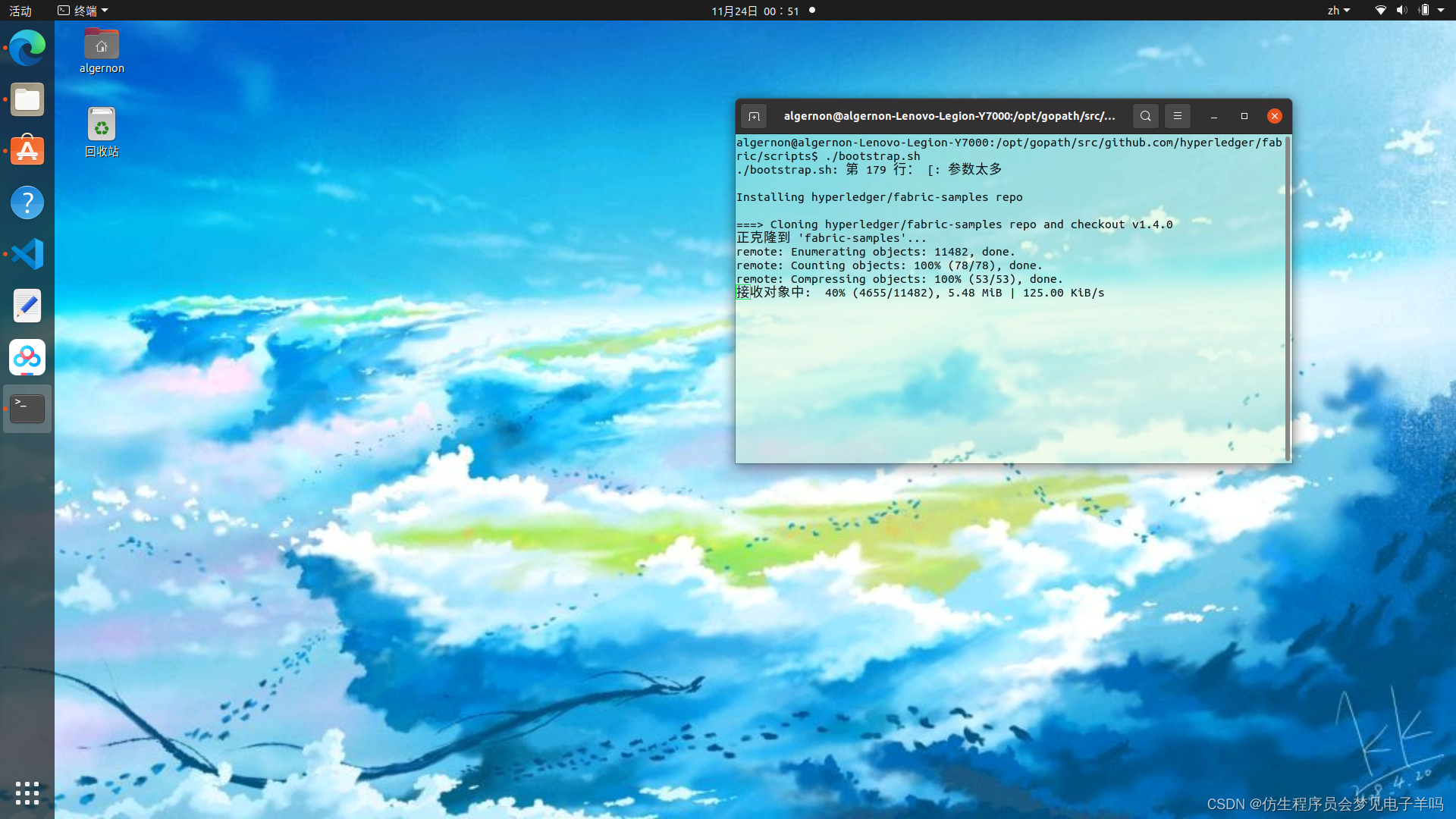
实验一
network
./network.sh up
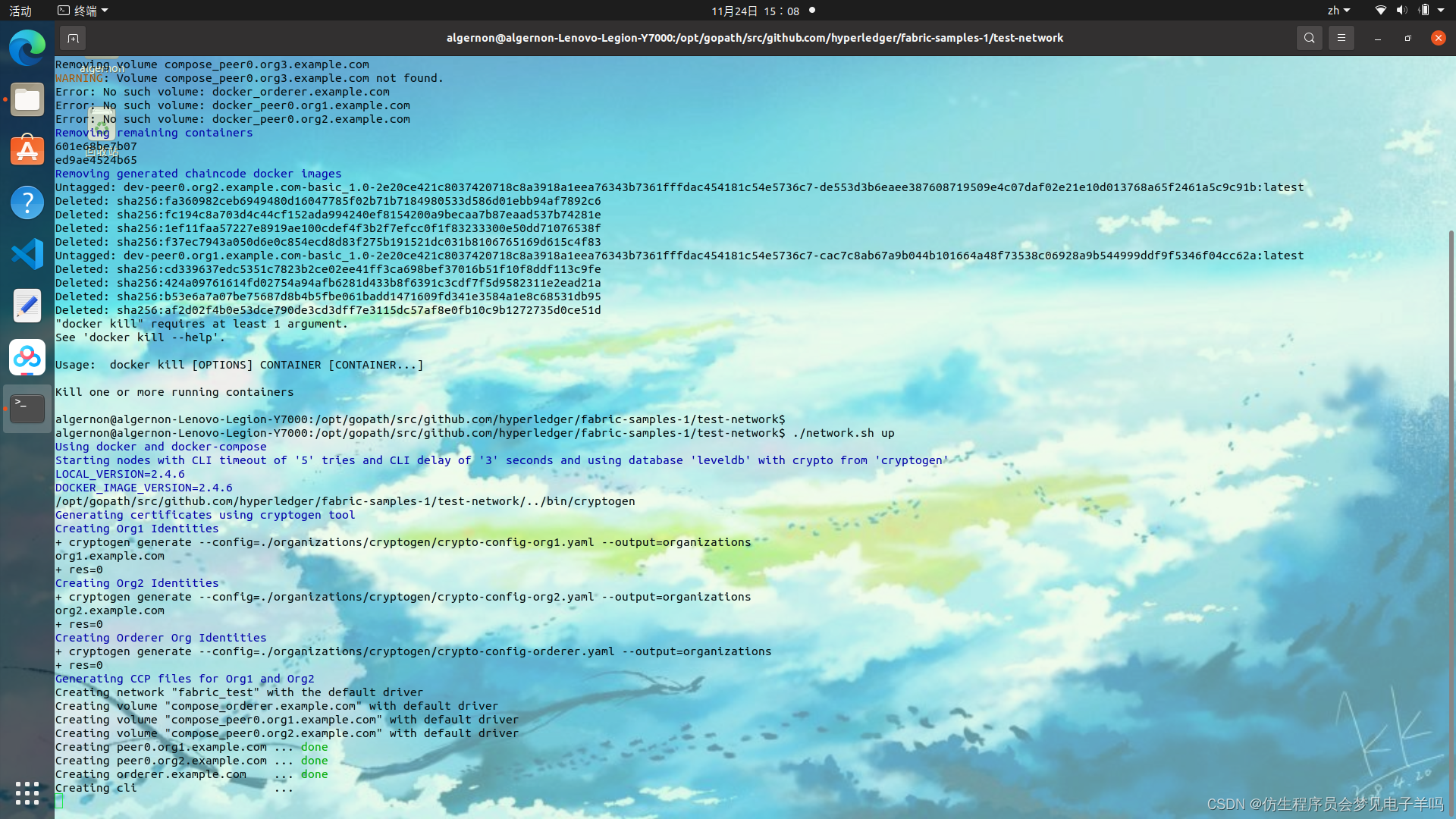
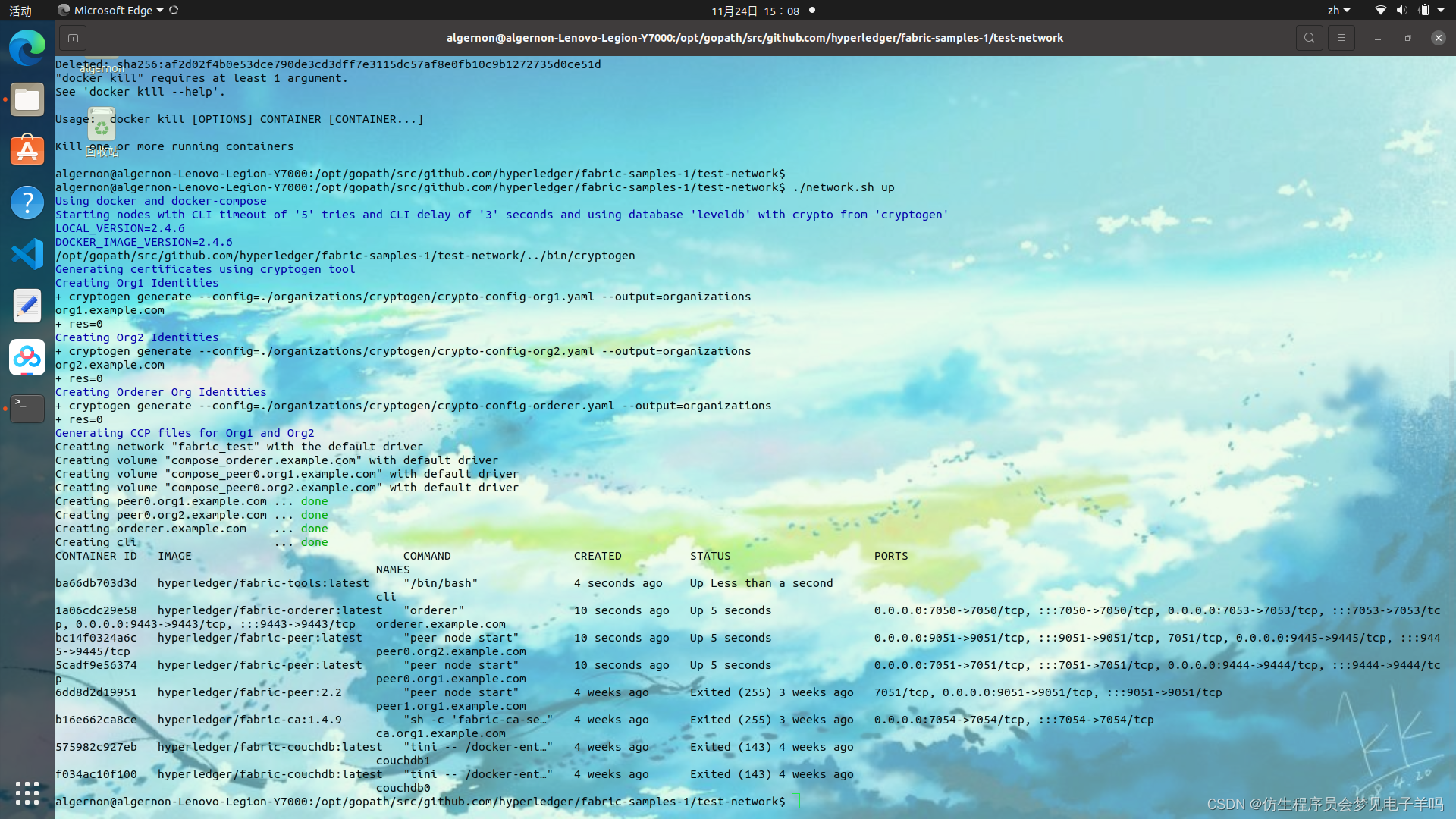
./network.sh up createChannel -s couchdb
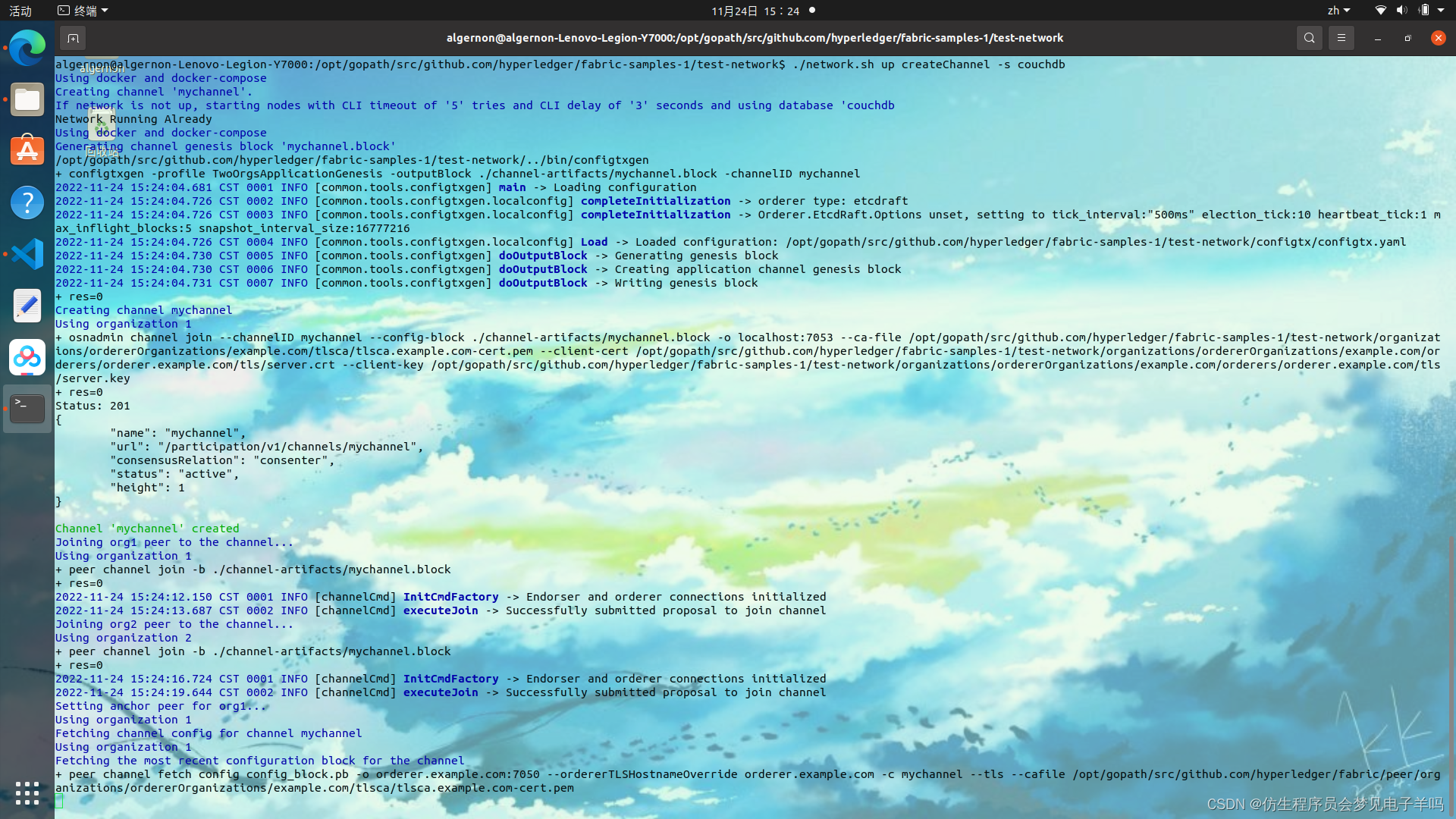
./network.sh deployCC -ccn basic -ccp ../asset-transfer-basic/chaincode-go -ccl go
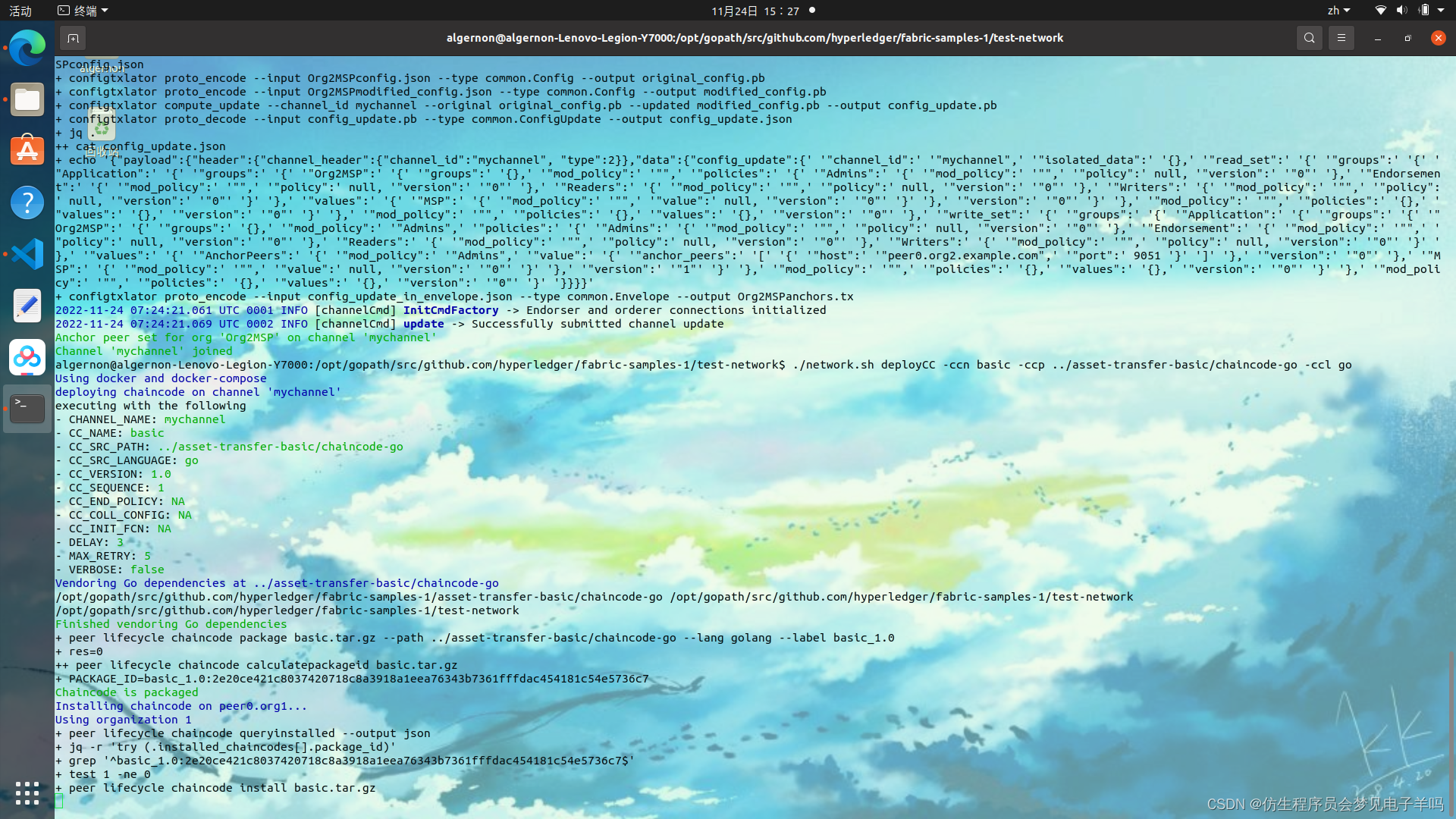
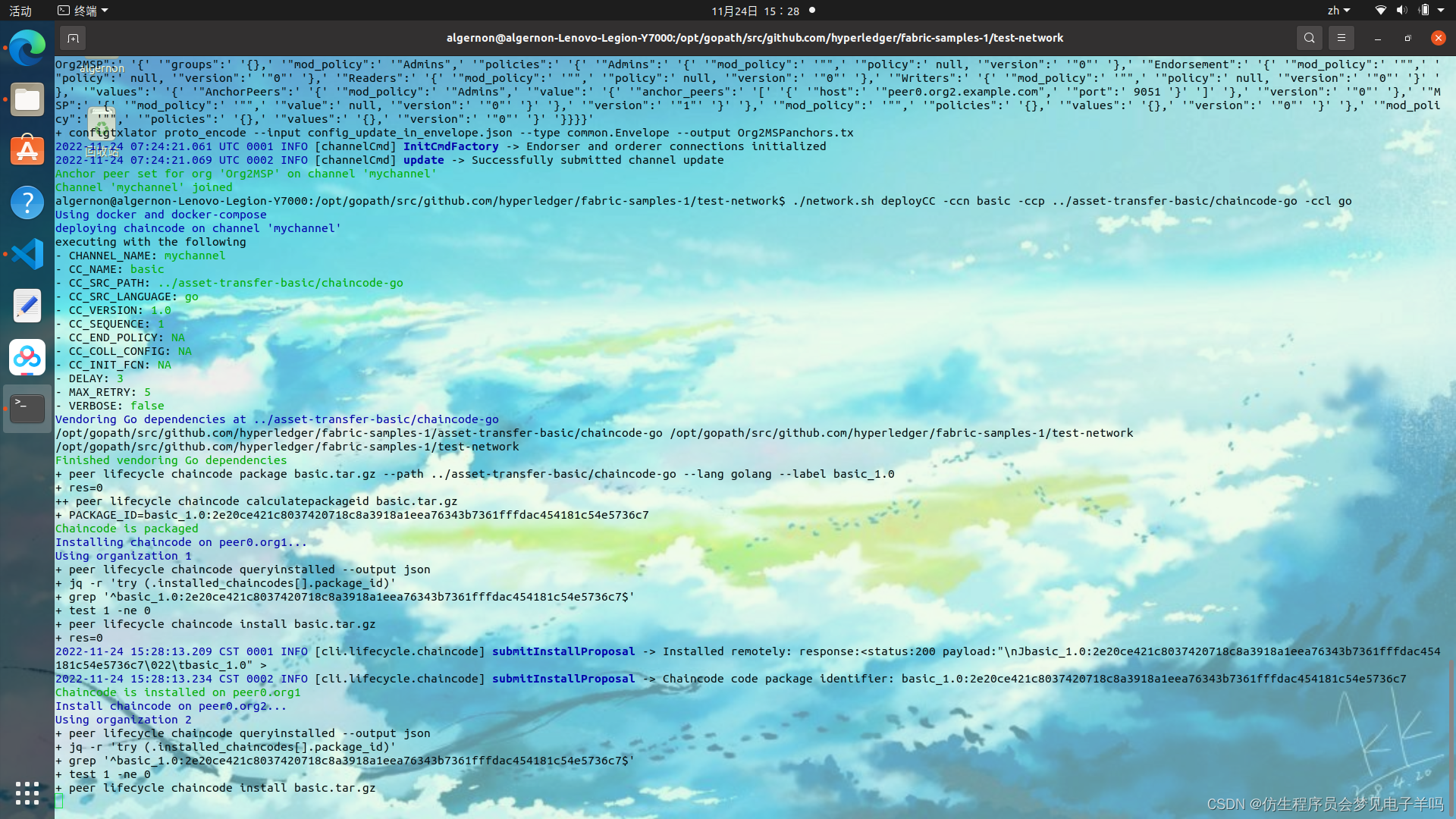
export PATH=${
PWD}/../bin:$PATH
export FABRIC_CFG_PATH=$PWD/../config/
export CORE_PEER_TLS_ENABLED=true
export CORE_PEER_LOCALMSPID="Org1MSP"
export CORE_PEER_TLS_ROOTCERT_FILE=${
PWD}/organizations/peerOrganizations/org1.example.com/peers/peer0.org1.example.com/tls/ca.crt
export CORE_PEER_MSPCONFIGPATH=${
PWD}/organizations/peerOrganizations/org1.example.com/users/Admin@org1.example.com/msp
export CORE_PEER_ADDRESS=localhost:7051
peer chaincode invoke -o localhost:7050 --ordererTLSHostnameOverride orderer.example.com --tls --cafile "${PWD}/organizations/ordererOrganizations/example.com/orderers/orderer.example.com/msp/tlscacerts/tlsca.example.com-cert.pem" -C mychannel -n basic --peerAddresses localhost:7051 --tlsRootCertFiles "${PWD}/organizations/peerOrganizations/org1.example.com/peers/peer0.org1.example.com/tls/ca.crt" --peerAddresses localhost:9051 --tlsRootCertFiles "${PWD}/organizations/peerOrganizations/org2.example.com/peers/peer0.org2.example.com/tls/ca.crt" -c '{
"function":"InitLedger","Args":[""]}'
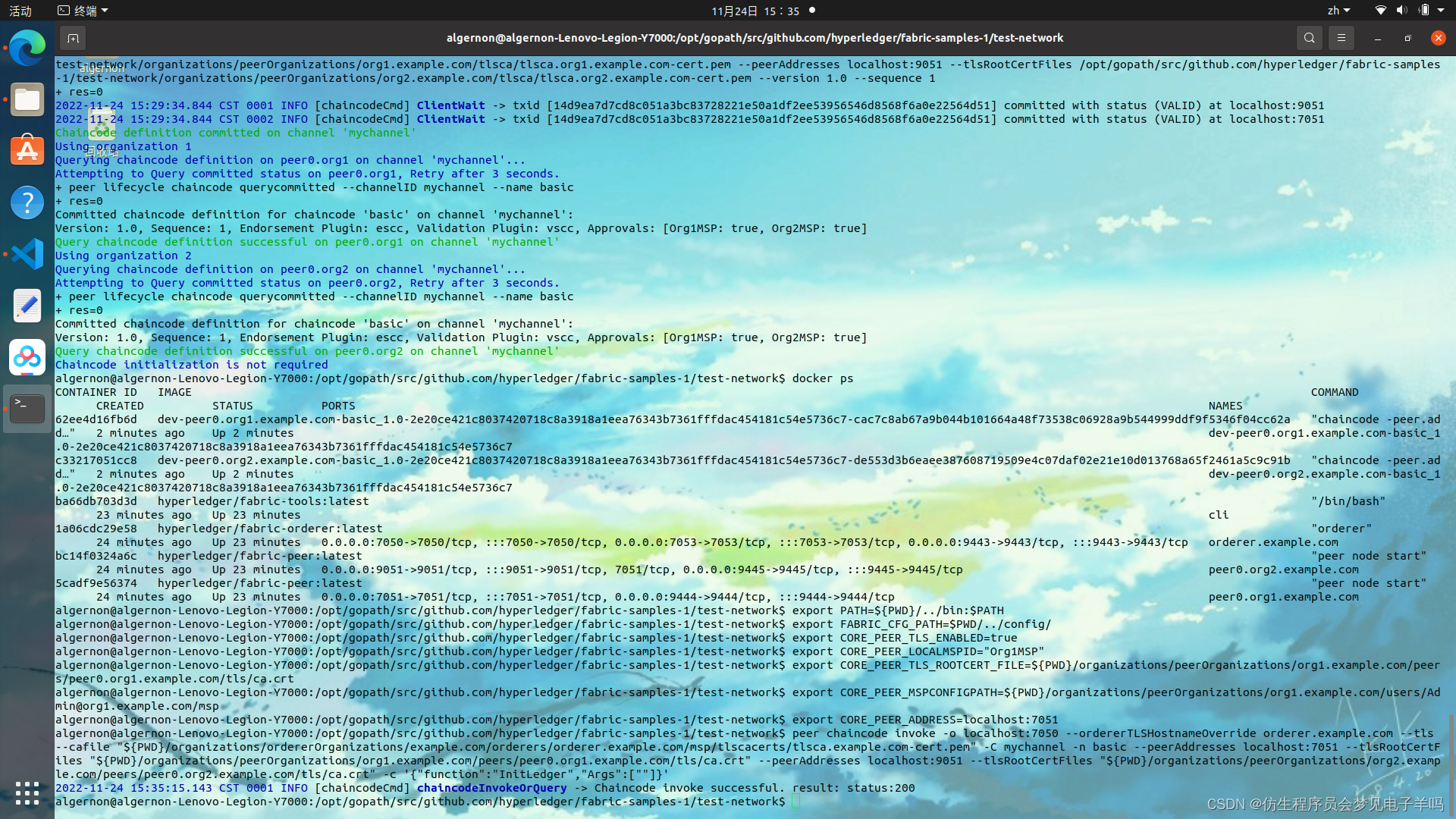
restart
./network.sh up createChannel -ca -s couchdb
gin模板
package main
import (
"fmt"
"github.com/gin-gonic/gin"
)
type Stu struct {
Name string `form:"name"`
Id string `form:"id"`
Age string `form:"age"`
}
func main() {
r := gin.Default()
var stu Stu
r1 := r.Group("/fabric2.4")
r1.POST("/setstu", func(c *gin.Context) {
//var stu Stu
c.ShouldBind(&stu)
c.JSON(200, stu)
fmt.Println("stu:", stu)
})
r1.POST("/ok1", func(c *gin.Context) {
c.JSON(200, "ok1")
})
r.Run(":8080") // 监听并在 0.0.0.0:8080 上启动服务
}
链码的只要功能部分:
package chaincode
import (
"encoding/json"
"fmt"
"github.com/hyperledger/fabric-contract-api-go/contractapi"
)
// SmartContract provides functions for managing an Asset
type SmartContract struct {
contractapi.Contract
}
// Asset describes basic details of what makes up a simple asset
//Insert struct field in alphabetic order => to achieve determinism across languages
// golang keeps the order when marshal to json but doesn't order automatically
type Asset struct {
AppraisedValue int `json:"AppraisedValue"`
Color string `json:"Color"`
ID string `json:"ID"`
Owner string `json:"Owner"`
Size int `json:"Size"`
}
// InitLedger adds a base set of assets to the ledger
func (s *SmartContract) InitLedger(ctx contractapi.TransactionContextInterface) error {
assets := []Asset{
{
ID: "asset1", Color: "blue", Size: 5, Owner: "Tomoko", AppraisedValue: 300},
{
ID: "asset2", Color: "red", Size: 5, Owner: "Brad", AppraisedValue: 400},
{
ID: "asset3", Color: "green", Size: 10, Owner: "Jin Soo", AppraisedValue: 500},
{
ID: "asset4", Color: "yellow", Size: 10, Owner: "Max", AppraisedValue: 600},
{
ID: "asset5", Color: "black", Size: 15, Owner: "Adriana", AppraisedValue: 700},
{
ID: "asset6", Color: "white", Size: 15, Owner: "Michel", AppraisedValue: 800},
}
for _, asset := range assets {
assetJSON, err := json.Marshal(asset)
if err != nil {
return err
}
err = ctx.GetStub().PutState(asset.ID, assetJSON)
if err != nil {
return fmt.Errorf("failed to put to world state. %v", err)
}
}
return nil
}
// CreateAsset issues a new asset to the world state with given details.
func (s *SmartContract) CreateAsset(ctx contractapi.TransactionContextInterface, id string, color string, size int, owner string, appraisedValue int) error {
exists, err := s.AssetExists(ctx, id)
if err != nil {
return err
}
if exists {
return fmt.Errorf("the asset %s already exists", id)
}
asset := Asset{
ID: id,
Color: color,
Size: size,
Owner: owner,
AppraisedValue: appraisedValue,
}
assetJSON, err := json.Marshal(asset)
if err != nil {
return err
}
return ctx.GetStub().PutState(id, assetJSON)
}
// ReadAsset returns the asset stored in the world state with given id.
func (s *SmartContract) ReadAsset(ctx contractapi.TransactionContextInterface, id string) (*Asset, error) {
assetJSON, err := ctx.GetStub().GetState(id)
if err != nil {
return nil, fmt.Errorf("failed to read from world state: %v", err)
}
if assetJSON == nil {
return nil, fmt.Errorf("the asset %s does not exist", id)
}
var asset Asset
err = json.Unmarshal(assetJSON, &asset)
if err != nil {
return nil, err
}
return &asset, nil
}
// UpdateAsset updates an existing asset in the world state with provided parameters.
func (s *SmartContract) UpdateAsset(ctx contractapi.TransactionContextInterface, id string, color string, size int, owner string, appraisedValue int) error {
exists, err := s.AssetExists(ctx, id)
if err != nil {
return err
}
if !exists {
return fmt.Errorf("the asset %s does not exist", id)
}
// overwriting original asset with new asset
asset := Asset{
ID: id,
Color: color,
Size: size,
Owner: owner,
AppraisedValue: appraisedValue,
}
assetJSON, err := json.Marshal(asset)
if err != nil {
return err
}
return ctx.GetStub().PutState(id, assetJSON)
}
// DeleteAsset deletes an given asset from the world state.
func (s *SmartContract) DeleteAsset(ctx contractapi.TransactionContextInterface, id string) error {
exists, err := s.AssetExists(ctx, id)
if err != nil {
return err
}
if !exists {
return fmt.Errorf("the asset %s does not exist", id)
}
return ctx.GetStub().DelState(id)
}
// AssetExists returns true when asset with given ID exists in world state
func (s *SmartContract) AssetExists(ctx contractapi.TransactionContextInterface, id string) (bool, error) {
assetJSON, err := ctx.GetStub().GetState(id)
if err != nil {
return false, fmt.Errorf("failed to read from world state: %v", err)
}
return assetJSON != nil, nil
}
// TransferAsset updates the owner field of asset with given id in world state, and returns the old owner.
func (s *SmartContract) TransferAsset(ctx contractapi.TransactionContextInterface, id string, newOwner string) (string, error) {
asset, err := s.ReadAsset(ctx, id)
if err != nil {
return "", err
}
oldOwner := asset.Owner
asset.Owner = newOwner
assetJSON, err := json.Marshal(asset)
if err != nil {
return "", err
}
err = ctx.GetStub().PutState(id, assetJSON)
if err != nil {
return "", err
}
return oldOwner, nil
}
// GetAllAssets returns all assets found in world state
func (s *SmartContract) GetAllAssets(ctx contractapi.TransactionContextInterface) ([]*Asset, error) {
// range query with empty string for startKey and endKey does an
// open-ended query of all assets in the chaincode namespace.
resultsIterator, err := ctx.GetStub().GetStateByRange("", "")
if err != nil {
return nil, err
}
defer resultsIterator.Close()
var assets []*Asset
for resultsIterator.HasNext() {
queryResponse, err := resultsIterator.Next()
if err != nil {
return nil, err
}
var asset Asset
err = json.Unmarshal(queryResponse.Value, &asset)
if err != nil {
return nil, err
}
assets = append(assets, &asset)
}
return assets, nil
}
查看虚拟机的IP和地址:
ifconfig
gin框架
package main
import (
"bytes"
"crypto/x509"
"encoding/json"
"fmt"
"github.com/gin-gonic/gin"
"github.com/hyperledger/fabric-gateway/pkg/client"
"github.com/hyperledger/fabric-gateway/pkg/identity"
"google.golang.org/grpc"
"google.golang.org/grpc/credentials"
"io/ioutil"
"path"
"time"
)
const (
mspID = "Org1MSP"
cryptoPath = "./peerOrganizations/org1.example.com"
certPath = cryptoPath + "/users/[email protected]/msp/signcerts/cert.pem"
keyPath = cryptoPath + "/users/[email protected]/msp/keystore/"
tlsCertPath = cryptoPath + "/peers/peer0.org1.example.com/tls/ca.crt"
peerEndpoint = "192.168.136.130:7051"
gatewayPeer = "peer0.org1.example.com"
channelName = "mychannel"
chaincodeName = "basic"
)
type Asset struct {
AppraisedValue int `form:"appraisedValue" json:"appraisedValue" `
Color string `form:"color" json:"color"`
ID string `form:"id" json:"id"`
Owner string `form:"owner" json:"owner"`
Size int `form:"size" json:"size"`
}
func main() {
// The gRPC client connection should be shared by all Gateway connections to this endpoint
clientConnection := newGrpcConnection()
defer clientConnection.Close()
id := newIdentity()
sign := newSign()
// Create a Gateway connection for a specific client identity
gateway, err := client.Connect(
id,
client.WithSign(sign),
client.WithClientConnection(clientConnection),
// Default timeouts for different gRPC calls
client.WithEvaluateTimeout(5*time.Second),
client.WithEndorseTimeout(15*time.Second),
client.WithSubmitTimeout(5*time.Second),
client.WithCommitStatusTimeout(1*time.Minute),
)
if err != nil {
panic(err)
}
defer gateway.Close()
network := gateway.GetNetwork(channelName)
contract := network.GetContract(chaincodeName)
r := gin.Default()
r1 := r.Group("/fabric2.4")
r1.POST("/CreateAsset", func(c *gin.Context) {
var asset Asset
c.ShouldBind(&asset)
c.JSON(200, asset)
marshal, _ := json.Marshal(asset)
fmt.Println(string(marshal))
fmt.Println("asset:", asset)
})
r1.POST("/GetAllAssets", func(c *gin.Context) {
result := getAllAssets(contract)
c.JSON(200, result)
})
r.Run(":8080") // 监听并在 0.0.0.0:8080 上启动服务
}
// Evaluate a transaction to query ledger state.
func getAllAssets(contract *client.Contract) string {
fmt.Println("Evaluate Transaction: GetAllAssets, function returns all the current assets on the ledger")
evaluateResult, err := contract.EvaluateTransaction("GetAllAssets")
if err != nil {
panic(fmt.Errorf("failed to evaluate transaction: %w", err))
}
result := formatJSON(evaluateResult)
fmt.Printf("*** Result:%s\n", result)
return string(evaluateResult)
}
// newGrpcConnection creates a gRPC connection to the Gateway server.
func newGrpcConnection() *grpc.ClientConn {
certificate, err := loadCertificate(tlsCertPath)
if err != nil {
panic(err)
}
certPool := x509.NewCertPool()
certPool.AddCert(certificate)
transportCredentials := credentials.NewClientTLSFromCert(certPool, gatewayPeer)
connection, err := grpc.Dial(peerEndpoint, grpc.WithTransportCredentials(transportCredentials))
if err != nil {
panic(fmt.Errorf("failed to create gRPC connection: %w", err))
}
return connection
}
// newIdentity creates a client identity for this Gateway connection using an X.509 certificate.
func newIdentity() *identity.X509Identity {
certificate, err := loadCertificate(certPath)
if err != nil {
panic(err)
}
id, err := identity.NewX509Identity(mspID, certificate)
if err != nil {
panic(err)
}
return id
}
func loadCertificate(filename string) (*x509.Certificate, error) {
certificatePEM, err := ioutil.ReadFile(filename)
if err != nil {
return nil, fmt.Errorf("failed to read certificate file: %w", err)
}
return identity.CertificateFromPEM(certificatePEM)
}
// newSign creates a function that generates a digital signature from a message digest using a private key.
func newSign() identity.Sign {
files, err := ioutil.ReadDir(keyPath)
if err != nil {
panic(fmt.Errorf("failed to read private key directory: %w", err))
}
privateKeyPEM, err := ioutil.ReadFile(path.Join(keyPath, files[0].Name()))
if err != nil {
panic(fmt.Errorf("failed to read private key file: %w", err))
}
privateKey, err := identity.PrivateKeyFromPEM(privateKeyPEM)
if err != nil {
panic(err)
}
sign, err := identity.NewPrivateKeySign(privateKey)
if err != nil {
panic(err)
}
return sign
}
// Format JSON data
func formatJSON(data []byte) string {
var prettyJSON bytes.Buffer
if err := json.Indent(&prettyJSON, data, " ", ""); err != nil {
panic(fmt.Errorf("failed to parse JSON: %w", err))
}
return prettyJSON.String()
}
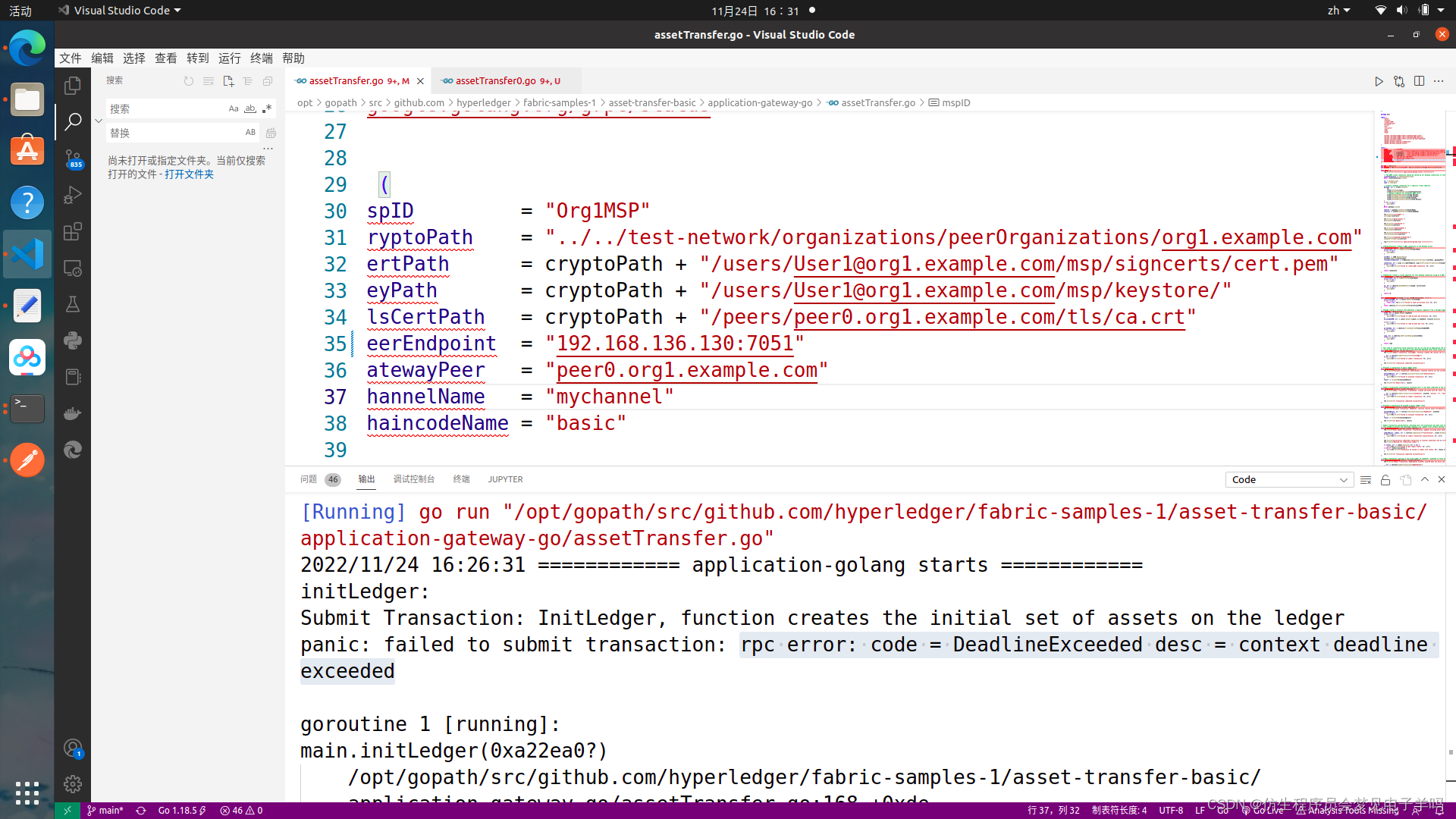
链码
package chaincode
import (
"encoding/json"
"fmt"
"github.com/hyperledger/fabric-contract-api-go/contractapi"
)
// SmartContract provides functions for managing an Asset
type SmartContract struct {
contractapi.Contract
}
// Asset describes basic details of what makes up a simple asset
//Insert struct field in alphabetic order => to achieve determinism across languages
// golang keeps the order when marshal to json but doesn't order automatically
type Asset struct {
AppraisedValue int `json:"AppraisedValue"`
Color string `json:"Color"`
ID string `json:"ID"`
Owner string `json:"Owner"`
Size int `json:"Size"`
}
// InitLedger adds a base set of assets to the ledger
func (s *SmartContract) InitLedger(ctx contractapi.TransactionContextInterface) error {
assets := []Asset{
{
ID: "asset1", Color: "blue", Size: 5, Owner: "Tomoko", AppraisedValue: 300},
{
ID: "asset2", Color: "red", Size: 5, Owner: "Brad", AppraisedValue: 400},
{
ID: "asset3", Color: "green", Size: 10, Owner: "Jin Soo", AppraisedValue: 500},
{
ID: "asset4", Color: "yellow", Size: 10, Owner: "Max", AppraisedValue: 600},
{
ID: "asset5", Color: "black", Size: 15, Owner: "Adriana", AppraisedValue: 700},
{
ID: "asset6", Color: "white", Size: 15, Owner: "Michel", AppraisedValue: 800},
}
for _, asset := range assets {
assetJSON, err := json.Marshal(asset)
if err != nil {
return err
}
err = ctx.GetStub().PutState(asset.ID, assetJSON)
if err != nil {
return fmt.Errorf("failed to put to world state. %v", err)
}
}
return nil
}
// CreateAsset issues a new asset to the world state with given details.
func (s *SmartContract) CreateAsset(ctx contractapi.TransactionContextInterface, id string, color string, size int, owner string, appraisedValue int) error {
exists, err := s.AssetExists(ctx, id)
if err != nil {
return err
}
if exists {
return fmt.Errorf("the asset %s already exists", id)
}
asset := Asset{
ID: id,
Color: color,
Size: size,
Owner: owner,
AppraisedValue: appraisedValue,
}
assetJSON, err := json.Marshal(asset)
if err != nil {
return err
}
return ctx.GetStub().PutState(id, assetJSON)
}
// ReadAsset returns the asset stored in the world state with given id.
func (s *SmartContract) ReadAsset(ctx contractapi.TransactionContextInterface, id string) (*Asset, error) {
assetJSON, err := ctx.GetStub().GetState(id)
if err != nil {
return nil, fmt.Errorf("failed to read from world state: %v", err)
}
if assetJSON == nil {
return nil, fmt.Errorf("the asset %s does not exist", id)
}
var asset Asset
err = json.Unmarshal(assetJSON, &asset)
if err != nil {
return nil, err
}
return &asset, nil
}
// UpdateAsset updates an existing asset in the world state with provided parameters.
func (s *SmartContract) UpdateAsset(ctx contractapi.TransactionContextInterface, id string, color string, size int, owner string, appraisedValue int) error {
exists, err := s.AssetExists(ctx, id)
if err != nil {
return err
}
if !exists {
return fmt.Errorf("the asset %s does not exist", id)
}
// overwriting original asset with new asset
asset := Asset{
ID: id,
Color: color,
Size: size,
Owner: owner,
AppraisedValue: appraisedValue,
}
assetJSON, err := json.Marshal(asset)
if err != nil {
return err
}
return ctx.GetStub().PutState(id, assetJSON)
}
// DeleteAsset deletes an given asset from the world state.
func (s *SmartContract) DeleteAsset(ctx contractapi.TransactionContextInterface, id string) error {
exists, err := s.AssetExists(ctx, id)
if err != nil {
return err
}
if !exists {
return fmt.Errorf("the asset %s does not exist", id)
}
return ctx.GetStub().DelState(id)
}
// AssetExists returns true when asset with given ID exists in world state
func (s *SmartContract) AssetExists(ctx contractapi.TransactionContextInterface, id string) (bool, error) {
assetJSON, err := ctx.GetStub().GetState(id)
if err != nil {
return false, fmt.Errorf("failed to read from world state: %v", err)
}
return assetJSON != nil, nil
}
// TransferAsset updates the owner field of asset with given id in world state, and returns the old owner.
func (s *SmartContract) TransferAsset(ctx contractapi.TransactionContextInterface, id string, newOwner string) (string, error) {
asset, err := s.ReadAsset(ctx, id)
if err != nil {
return "", err
}
oldOwner := asset.Owner
asset.Owner = newOwner
assetJSON, err := json.Marshal(asset)
if err != nil {
return "", err
}
err = ctx.GetStub().PutState(id, assetJSON)
if err != nil {
return "", err
}
return oldOwner, nil
}
// GetAllAssets returns all assets found in world state
func (s *SmartContract) GetAllAssets(ctx contractapi.TransactionContextInterface) ([]*Asset, error) {
// range query with empty string for startKey and endKey does an
// open-ended query of all assets in the chaincode namespace.
resultsIterator, err := ctx.GetStub().GetStateByRange("", "")
if err != nil {
return nil, err
}
defer resultsIterator.Close()
var assets []*Asset
for resultsIterator.HasNext() {
queryResponse, err := resultsIterator.Next()
if err != nil {
return nil, err
}
var asset Asset
err = json.Unmarshal(queryResponse.Value, &asset)
if err != nil {
return nil, err
}
assets = append(assets, &asset)
}
return assets, nil
}
postman
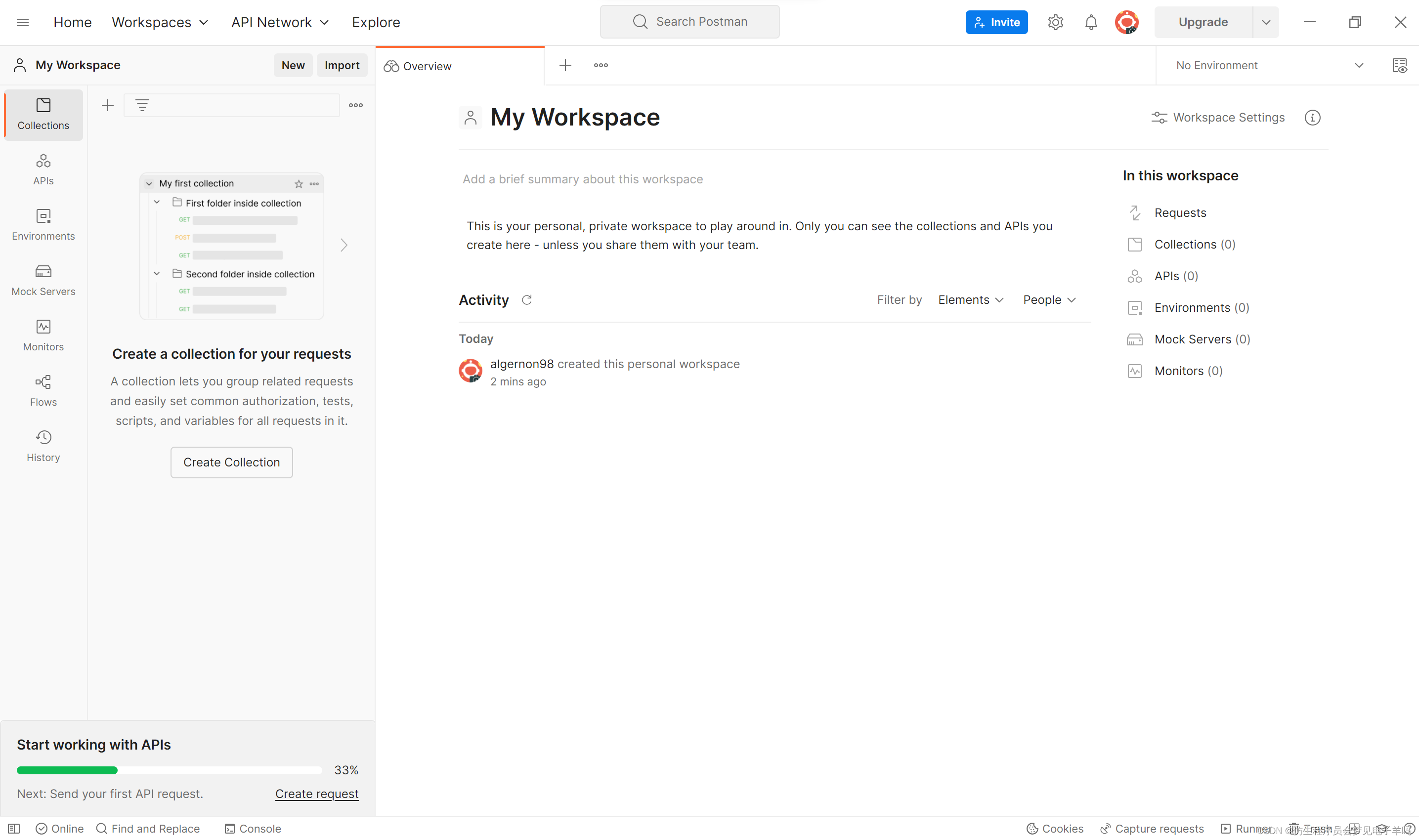
测试自家网站:
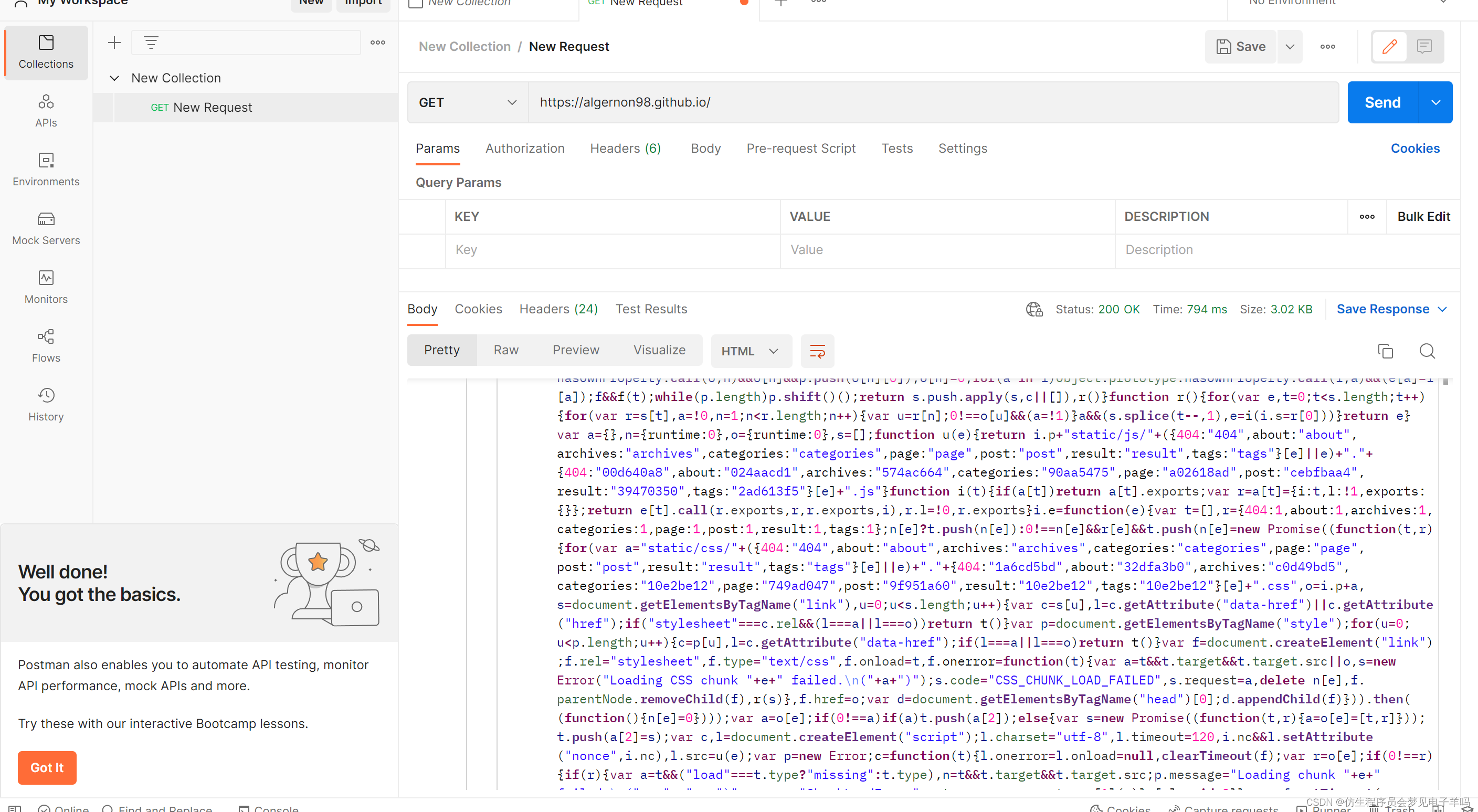
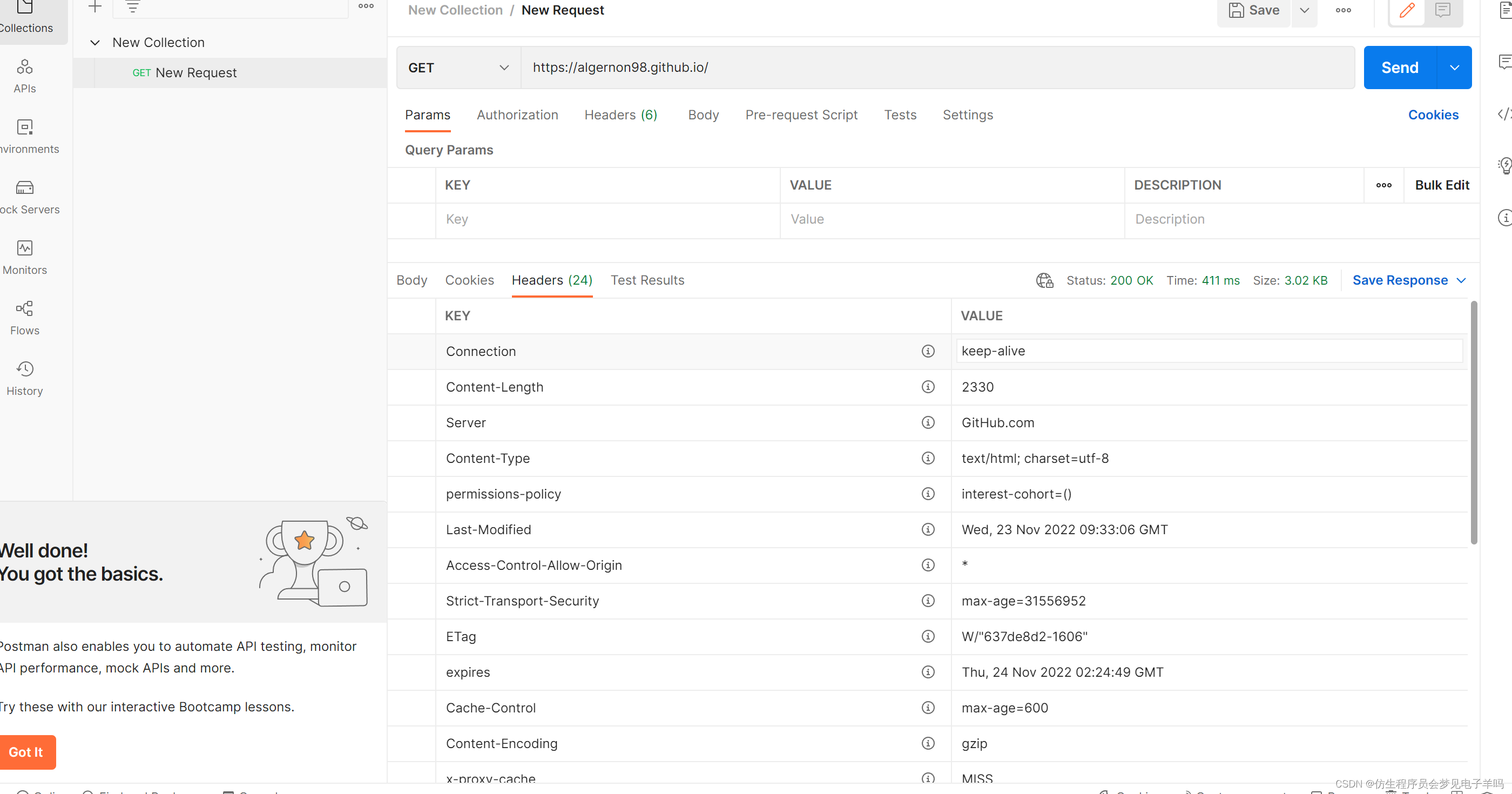
本地查询:
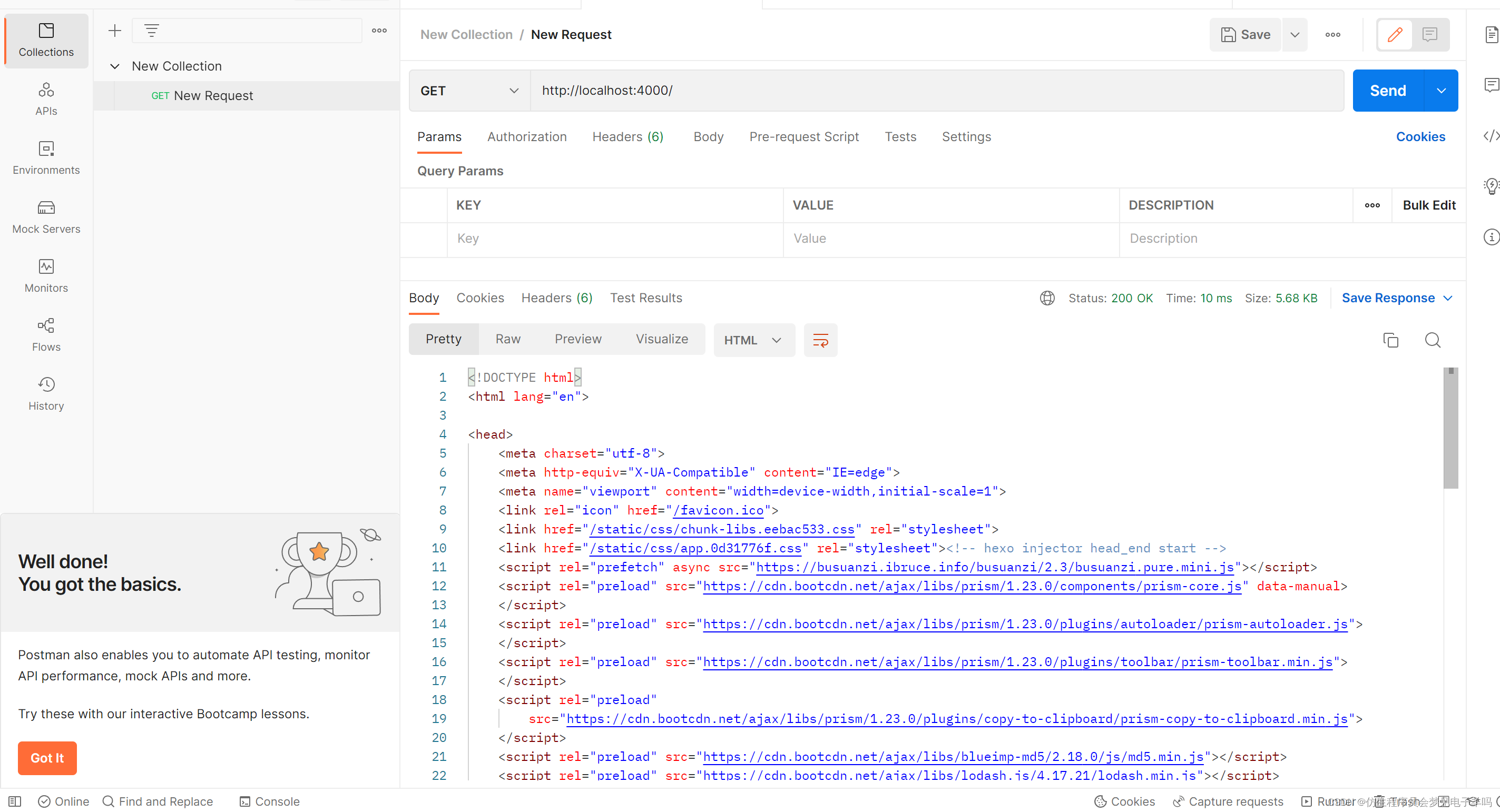
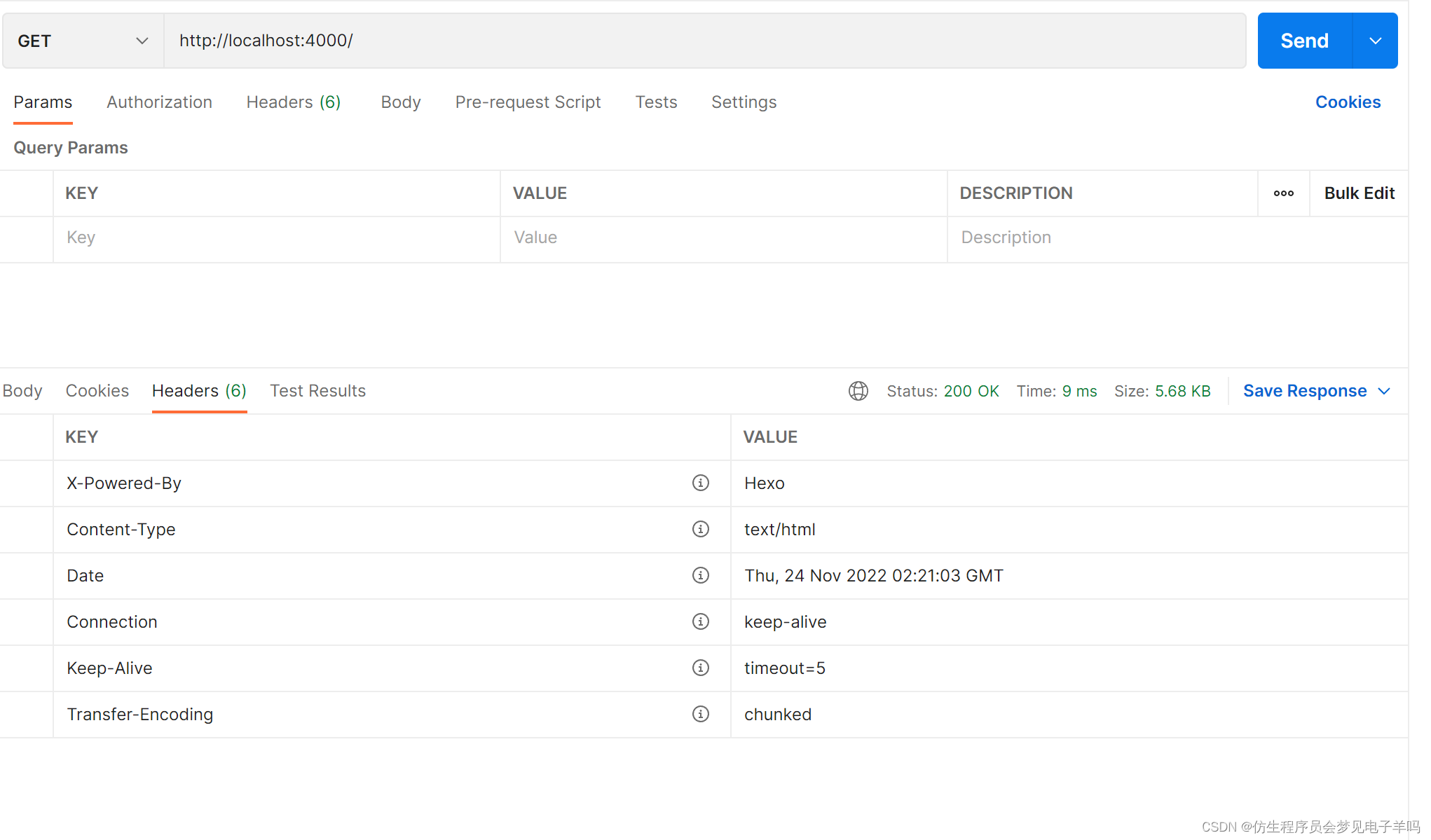
自己的github:
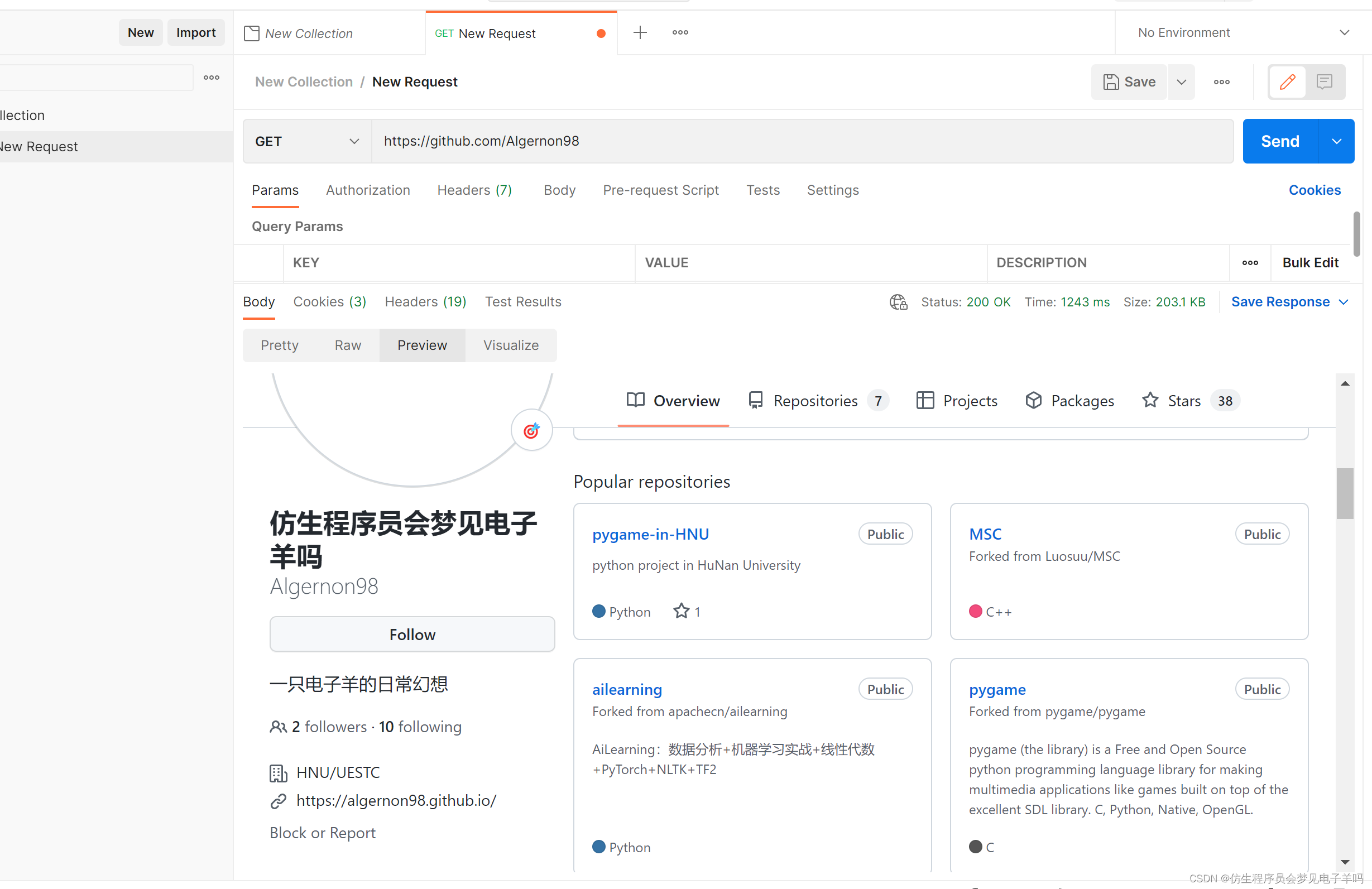
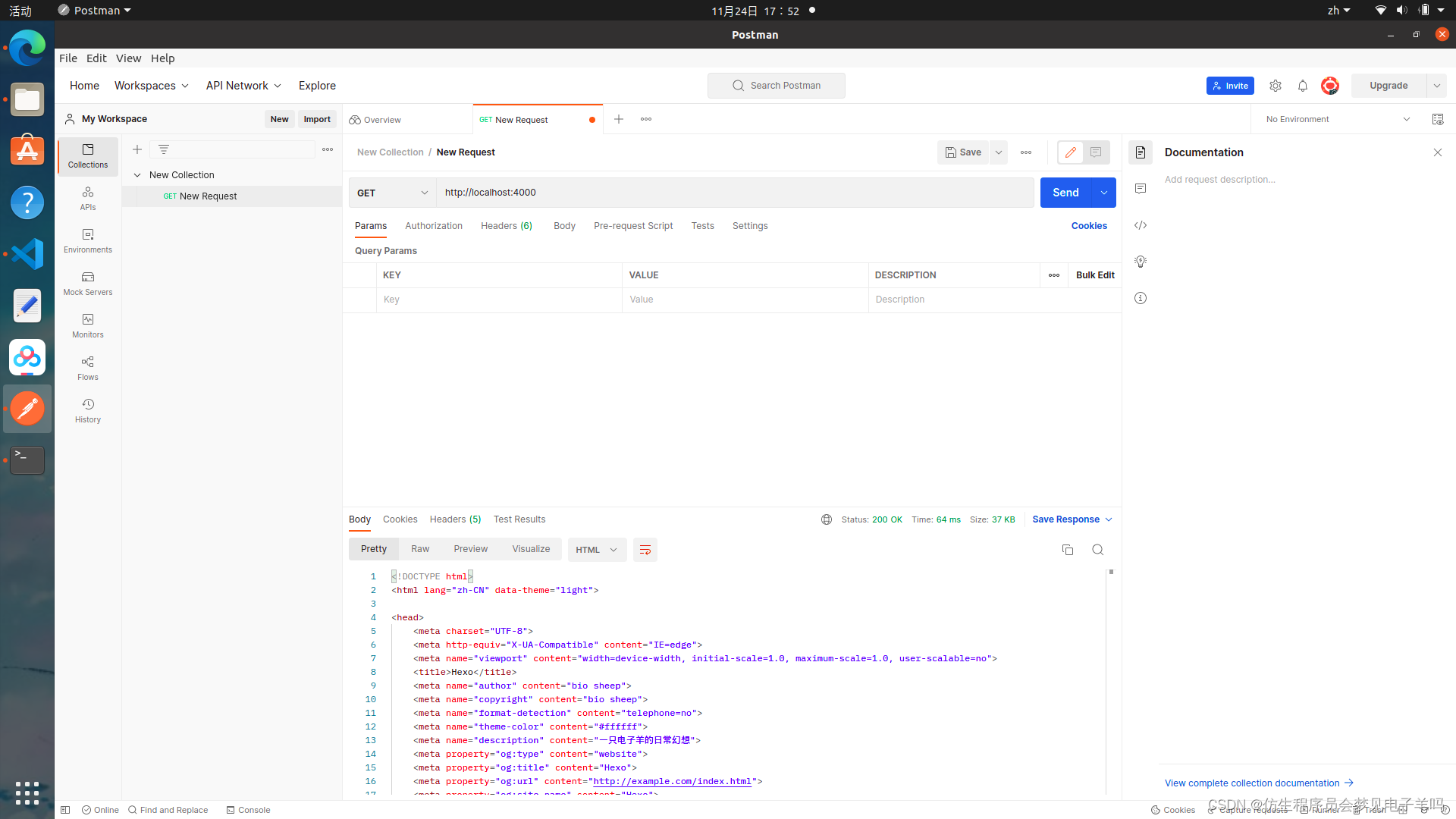
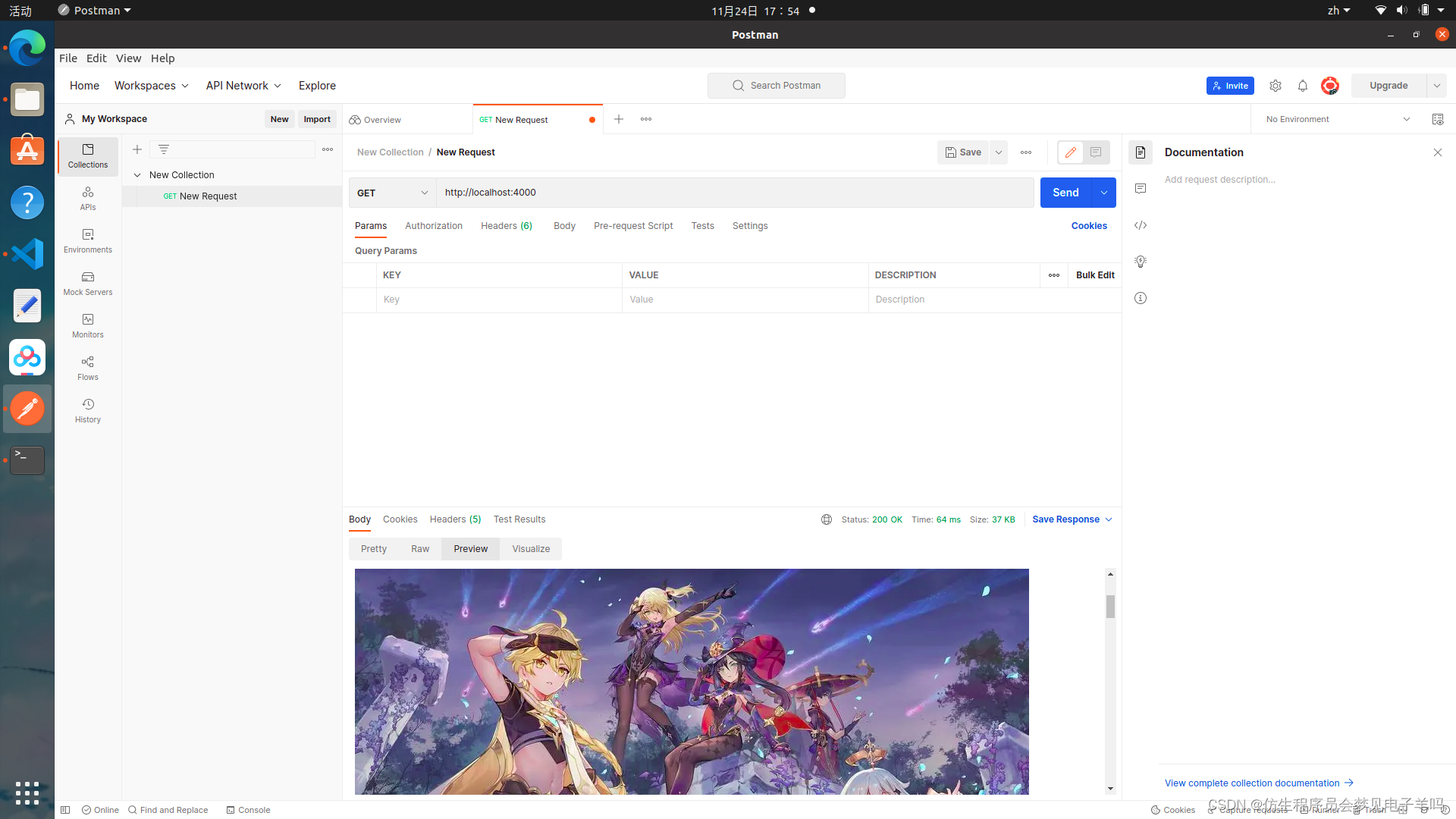
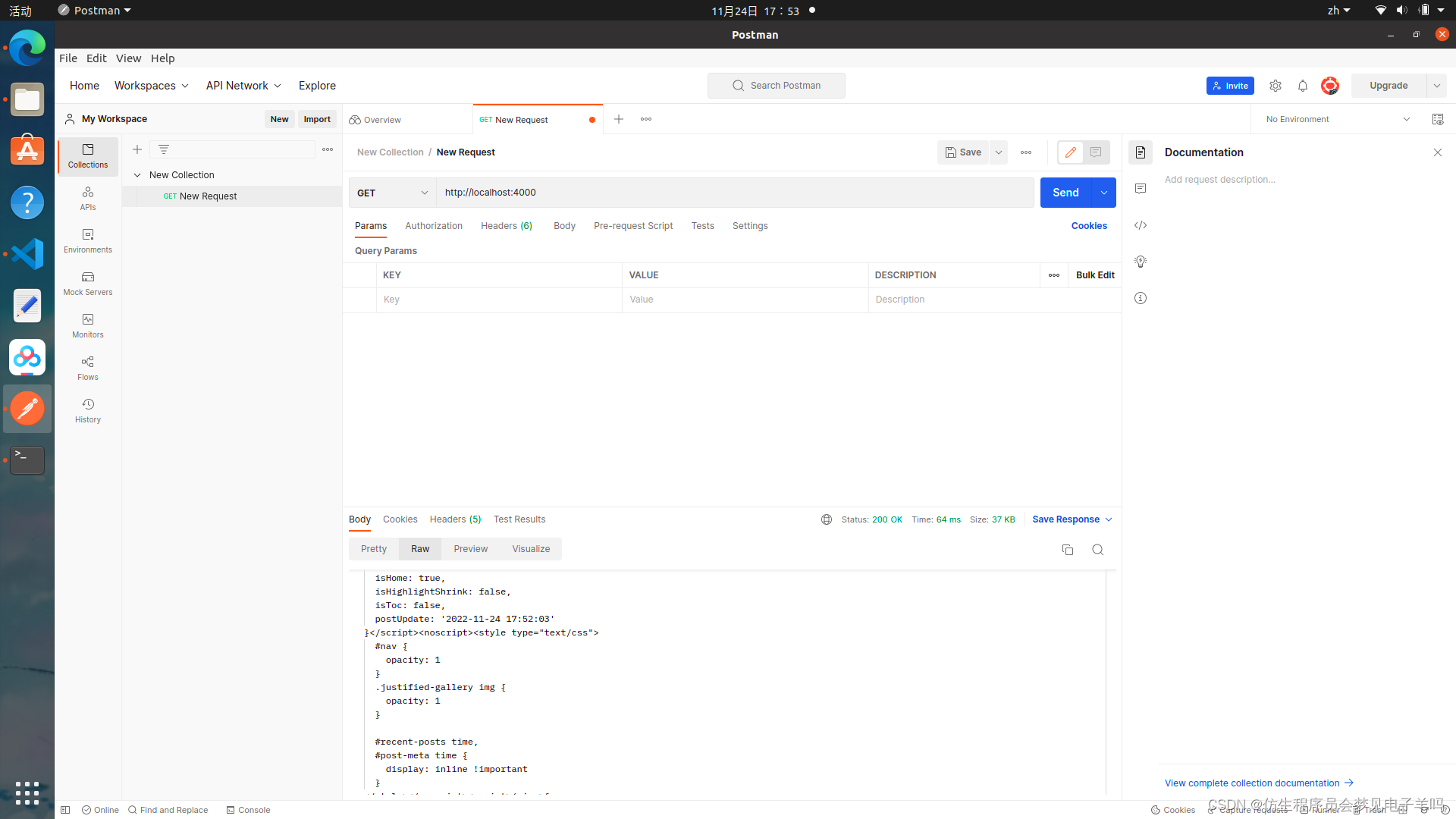
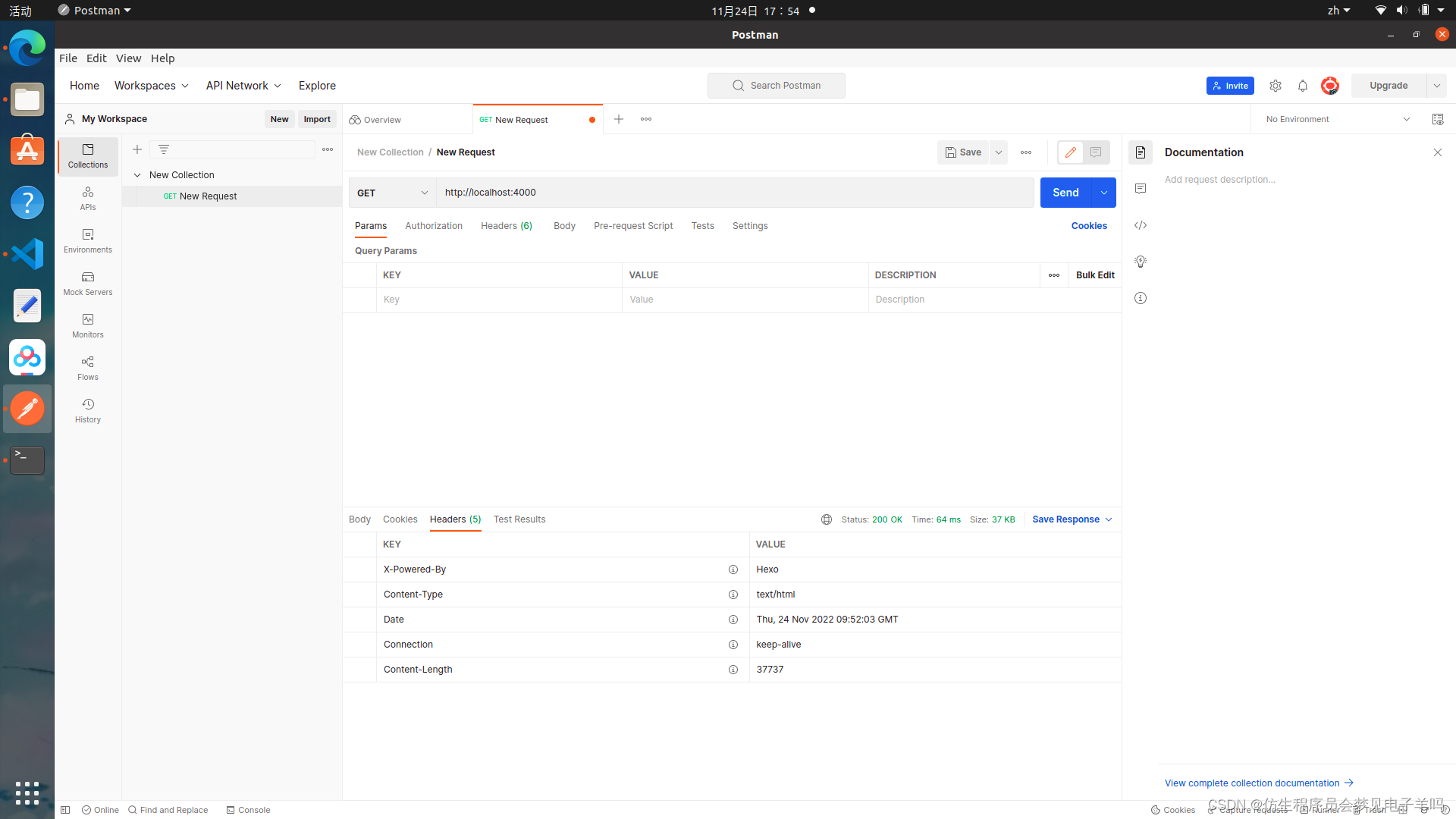
实验二
gin
package main
import (
"bytes"
"crypto/x509"
"encoding/json"
"fmt"
"github.com/gin-gonic/gin"
"github.com/hyperledger/fabric-gateway/pkg/client"
"github.com/hyperledger/fabric-gateway/pkg/identity"
"google.golang.org/grpc"
"google.golang.org/grpc/credentials"
"io/ioutil"
"path"
"time"
)
const (
mspID = "Org1MSP"
cryptoPath = "./peerOrganizations/org1.example.com"
certPath = cryptoPath + "/users/[email protected]/msp/signcerts/cert.pem"
keyPath = cryptoPath + "/users/[email protected]/msp/keystore/"
tlsCertPath = cryptoPath + "/peers/peer0.org1.example.com/tls/ca.crt"
peerEndpoint = "192.168.136.130:7051"
gatewayPeer = "peer0.org1.example.com"
channelName = "mychannel"
chaincodeName = "basic"
)
type Asset struct {
AppraisedValue int `form:"appraisedValue" json:"appraisedValue" `
Color string `form:"color" json:"color"`
ID string `form:"id" json:"id"`
Owner string `form:"owner" json:"owner"`
Size int `form:"size" json:"size"`
}
func main() {
// The gRPC client connection should be shared by all Gateway connections to this endpoint
clientConnection := newGrpcConnection()
defer clientConnection.Close()
id := newIdentity()
sign := newSign()
// Create a Gateway connection for a specific client identity
gateway, err := client.Connect(
id,
client.WithSign(sign),
client.WithClientConnection(clientConnection),
// Default timeouts for different gRPC calls
client.WithEvaluateTimeout(5*time.Second),
client.WithEndorseTimeout(15*time.Second),
client.WithSubmitTimeout(5*time.Second),
client.WithCommitStatusTimeout(1*time.Minute),
)
if err != nil {
panic(err)
}
defer gateway.Close()
network := gateway.GetNetwork(channelName)
contract := network.GetContract(chaincodeName)
r := gin.Default()
r1 := r.Group("/fabric2.4.2")
r1.POST("/Init", func(c *gin.Context) {
initLedger(contract)
c.JSON(200, "init ok!")
})
r.Run(":8080") // 监听并在 0.0.0.0:8080 上启动服务
}
// Evaluate a transaction to query ledger state.
func getAllAssets(contract *client.Contract) string {
fmt.Println("Evaluate Transaction: GetAllAssets, function returns all the current assets on the ledger")
evaluateResult, err := contract.EvaluateTransaction("GetAllAssets")
if err != nil {
panic(fmt.Errorf("failed to evaluate transaction: %w", err))
}
result := formatJSON(evaluateResult)
fmt.Printf("*** Result:%s\n", result)
return string(evaluateResult)
}
// newGrpcConnection creates a gRPC connection to the Gateway server.
func newGrpcConnection() *grpc.ClientConn {
certificate, err := loadCertificate(tlsCertPath)
if err != nil {
panic(err)
}
certPool := x509.NewCertPool()
certPool.AddCert(certificate)
transportCredentials := credentials.NewClientTLSFromCert(certPool, gatewayPeer)
connection, err := grpc.Dial(peerEndpoint, grpc.WithTransportCredentials(transportCredentials))
if err != nil {
panic(fmt.Errorf("failed to create gRPC connection: %w", err))
}
return connection
}
// newIdentity creates a client identity for this Gateway connection using an X.509 certificate.
func newIdentity() *identity.X509Identity {
certificate, err := loadCertificate(certPath)
if err != nil {
panic(err)
}
id, err := identity.NewX509Identity(mspID, certificate)
if err != nil {
panic(err)
}
return id
}
func loadCertificate(filename string) (*x509.Certificate, error) {
certificatePEM, err := ioutil.ReadFile(filename)
if err != nil {
return nil, fmt.Errorf("failed to read certificate file: %w", err)
}
return identity.CertificateFromPEM(certificatePEM)
}
// newSign creates a function that generates a digital signature from a message digest using a private key.
func newSign() identity.Sign {
files, err := ioutil.ReadDir(keyPath)
if err != nil {
panic(fmt.Errorf("failed to read private key directory: %w", err))
}
privateKeyPEM, err := ioutil.ReadFile(path.Join(keyPath, files[0].Name()))
if err != nil {
panic(fmt.Errorf("failed to read private key file: %w", err))
}
privateKey, err := identity.PrivateKeyFromPEM(privateKeyPEM)
if err != nil {
panic(err)
}
sign, err := identity.NewPrivateKeySign(privateKey)
if err != nil {
panic(err)
}
return sign
}
// Format JSON data
func formatJSON(data []byte) string {
var prettyJSON bytes.Buffer
if err := json.Indent(&prettyJSON, data, " ", ""); err != nil {
panic(fmt.Errorf("failed to parse JSON: %w", err))
}
return prettyJSON.String()
}
New asset部分:
把下图代码:
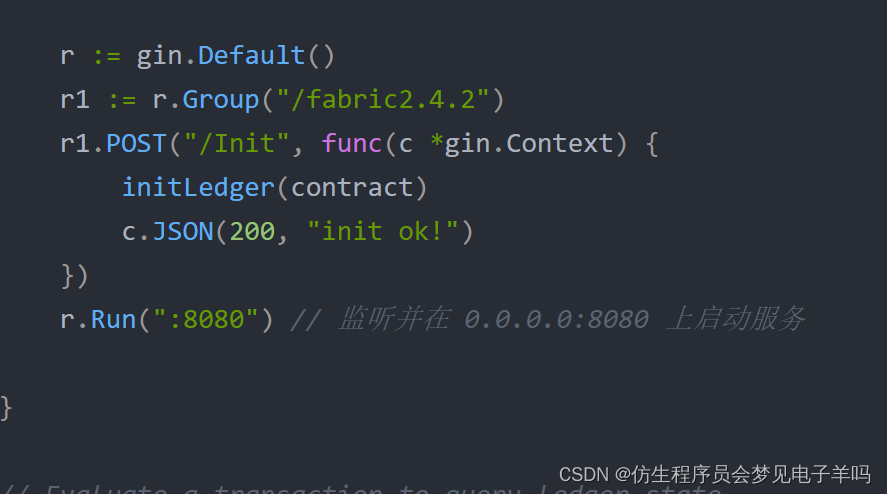
改为这个:
r1.POST("/CreateAsset", func(c *gin.Context) {
var asset Asset
c.ShouldBind(&asset)
c.JSON(200, asset)
marshal, _ := json.Marshal(asset)
CreateAsset(contract, asset)
fmt.Println("存入成功!存入的数据是:", string(marshal))
//fmt.Println("asset:", asset)
})
函数:
func CreateAsset(contract *client.Contract, asset Asset) string {
evaluateResult, err := contract.SubmitTransaction("CreateAsset", asset.ID, asset.Color, strconv.Itoa(asset.Size), asset.Owner, strconv.Itoa(asset.AppraisedValue))
if err != nil {
panic(fmt.Errorf("failed to evaluate transaction: %w", err))
}
result := formatJSON(evaluateResult)
fmt.Printf("*** Result:%s\n", result)
return string(evaluateResult)
}
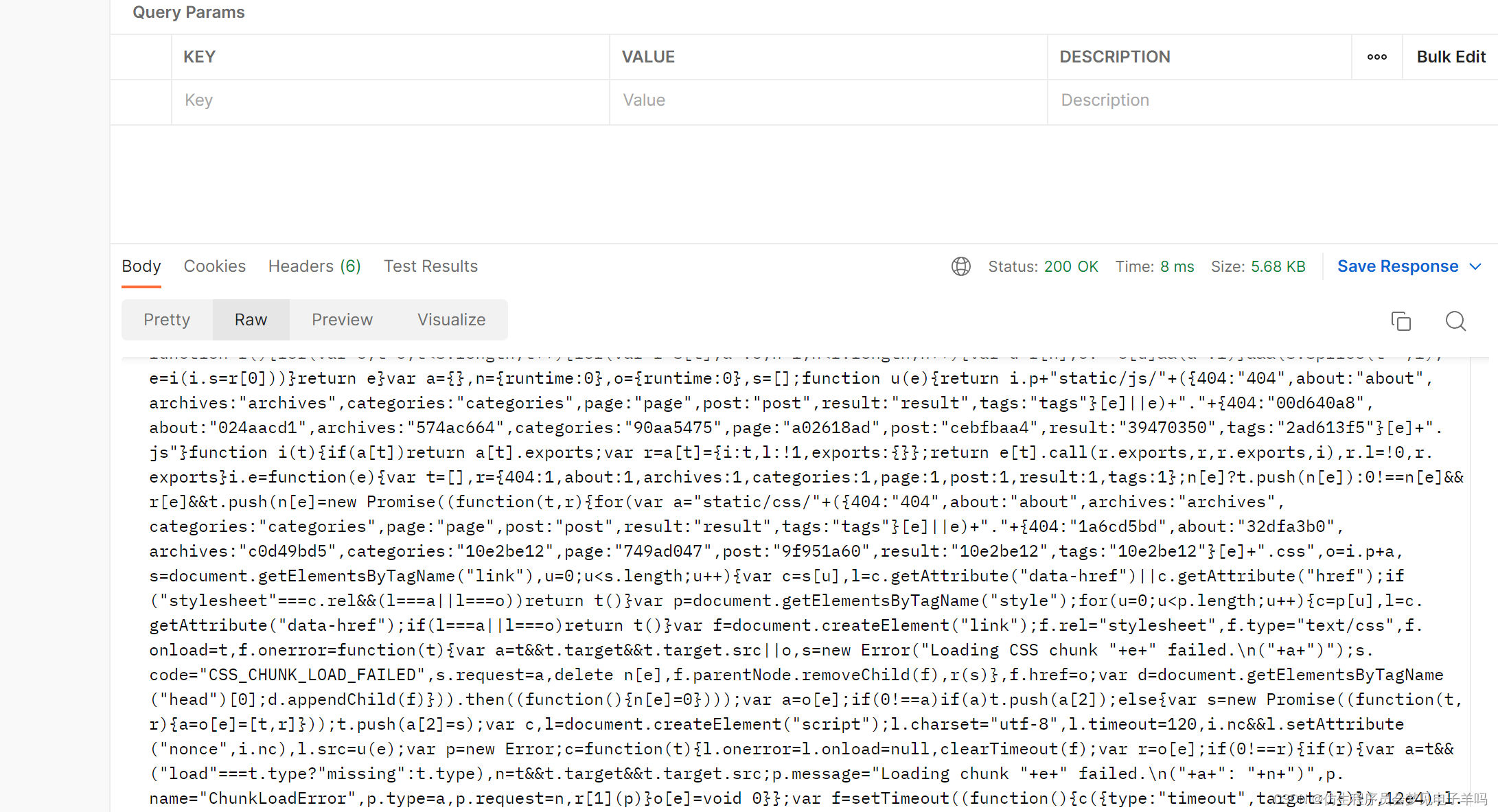
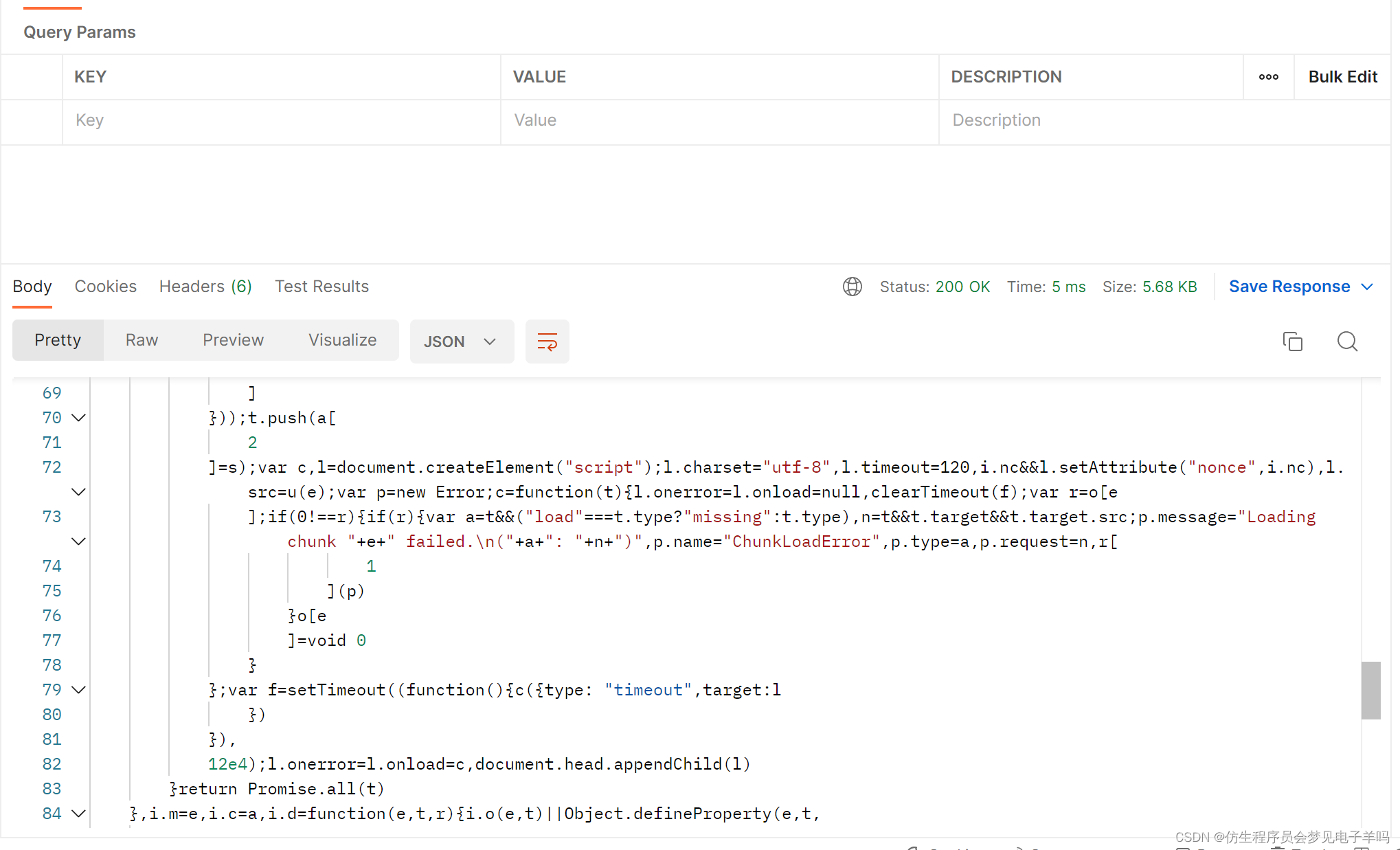
总结
本次实验内容内容不多,难度颇大。
其一在于作者默认搭好框架,所以需要按照前文做出适配。
其二是网络搭好之后的查询,如果看了前文,可以知道作者是修改了
https://github.com/hyperledger/fabric-samples/tree/main/asset-transfer-basic
部分的代码,也就是本文的gin框架部分。修改也很多,
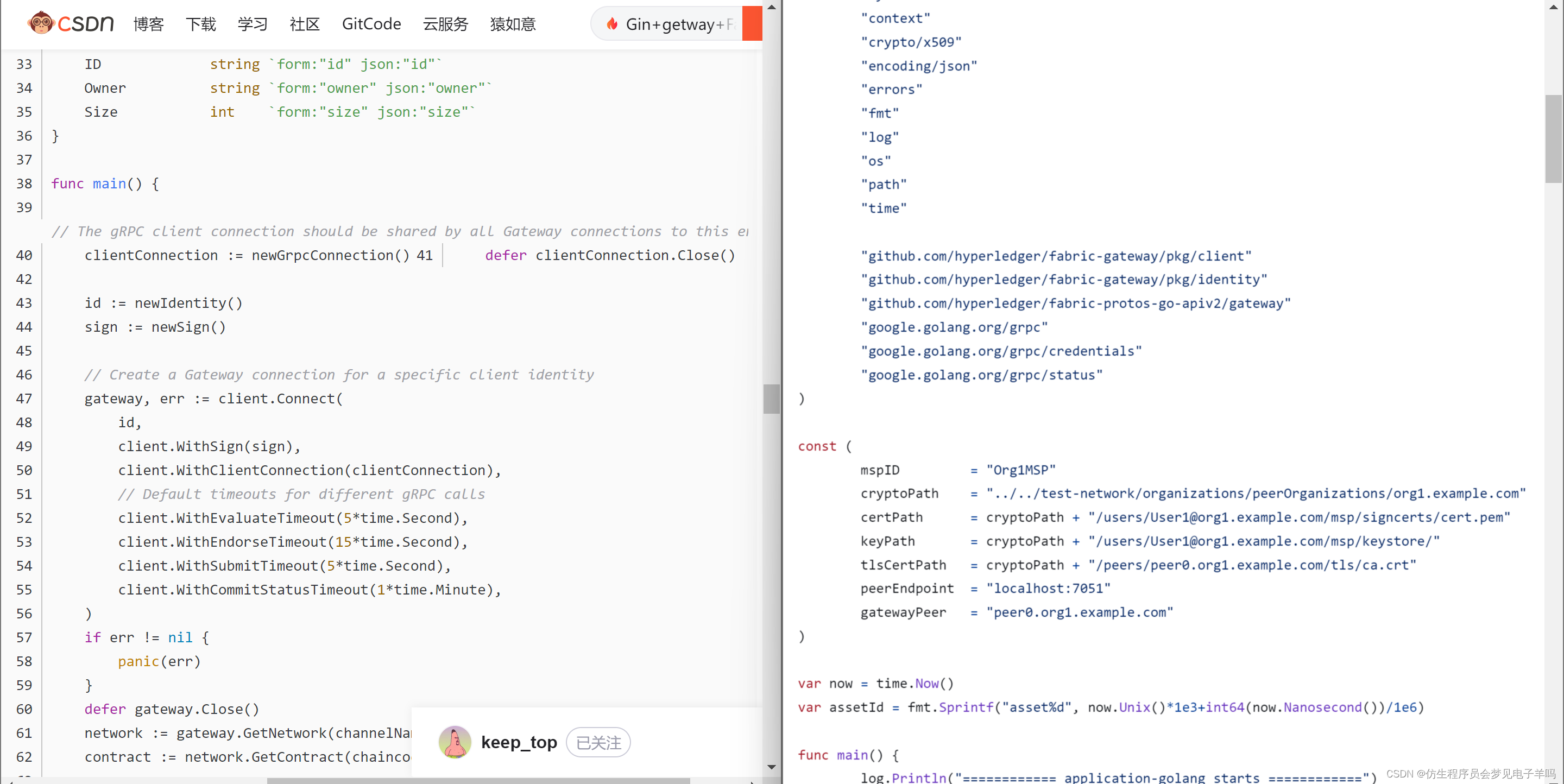
然后就是代码,代码在我这里经常报错,然后为了解决一个bug往往会搞出更多的问题,尤其是网络接口的占用,就在写文档的现在,我的7051端口莫名被占用了,为了更好完成期末任务,决定找一个正确而清晰的文档从头开始配置。(很大的原因是这几次作业下来整个fabric文件夹臃肿不堪,fabric-samples就有好几个,隔着几周时间回去看,有能运行的,也有当初是坑,后来没删的,总之,归零重启更有效)
在做两个实验之前,我先按照作者的思路配置了环境,主要是启动网络。
其次是一种很新的工具,postman,现在还没有完全摸清这个软件的用途,目前仅做查询网址用途。
第二个查询部分没有把assets查出来,可能是某个方面出了bug,之后会重新启用虚拟机,然后从头开始做一遍。
